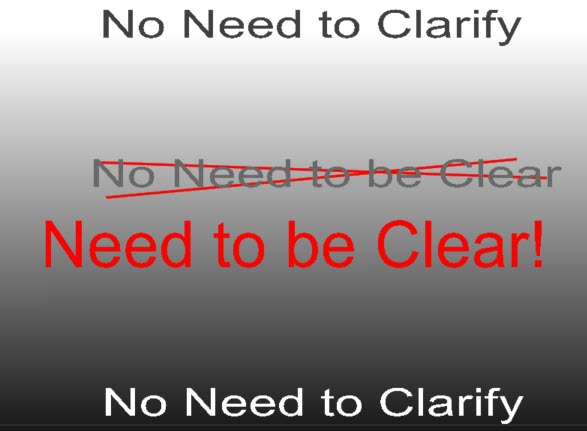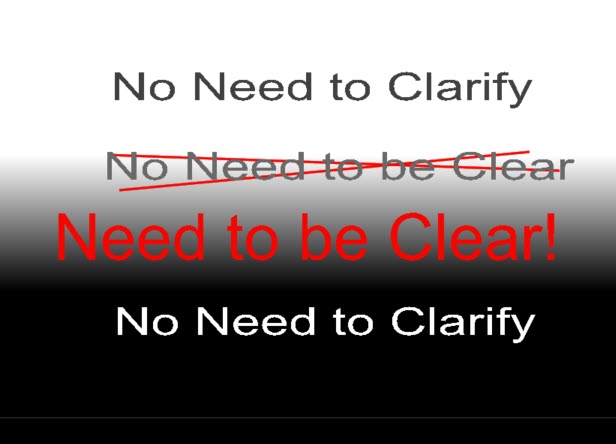It still burns. Decades later.
An "off" pass between the setter and me. We both move toward it. We both stop to look at each other. The ball bounces on the floor two feet from us.
"Why didn't you call it?"
"It was obvious."
"The ball bouncing on the floor proves otherwise."
By definition: if you're arguing over whether a ball should have been called, then it should have been called: it's obvious.
I don't lose my temper too often (at least I think I don't), but I lost it at volleyball yesterday. Again. Recurring issue.
It's shortest form:
"Hey, call what you're doing."
"I shouldn't have to call it."
"It doesn't matter if you shouldn't have to. It helps to clarify."
We can't seem to get past that.
Folks dig in - HARD - that they shouldn't have to call it.
My overall thoughts on this - universally - clarifying and communicating are a no brainer, especially if the cost of doing so is so low.
Basically, I keep getting arguments on why one shouldn't have to communicate, and I pretty much go straight to calling bullshit. Literally, shouting "That's Bullshit!" - which is way outside of any path to resolution. An apology is forthcoming.
But it's a recurring pattern and a recurring trigger, so I'm going to try to clarify my stance on clarification.
I'm going to describe my objections to these objections in terms of what I've learned in decades of process consulting: Risk/[Mitigation]Reward/Cost.
| Risk of Not "Calling the Ball": | losing the point, but more importantly, risk of injury. |
| Reward of "Calling the Ball": | better chance of winning the point, less chance of injury. |
| Cost: | speaking up |
The Risk is injury. The Mitigation is calling it when you "don't have to". The Reward is better chance of a strong point and less risk of serious injury.
The Cost of the Mitigation is yelling "I got it" when you don't have to. There appears to be huge divide on this, folks are willing for this to be a hill to die on.

To me the Cost of calling the ball when you "don't have to" is less than negligible.
To others, it seems like calling "I got it" when "allowed not to" is an onerous burden or humiliating capitulation. The cost is just too high, regardless of the reward of avoiding injury. "The really good teams or really good players don't have to do this." Is that the primary objection? Umm, I'm on this court, so, clearly, you can't count on all the players being well-trained or properly disciplined. Good teams just have a more narrow grey band.


|

|
Here are some of the arguments I hear for not communicating clearly:
| Weak Argument | Counter-Argument |
| "The setter shouldn't..." | how about: "The setter shouldn't assume that the team can instantaneously read his/her mind in a grey area" |
| "The hitter / defender should..." | There is a whole hierarchy of assumptions baked into this one. The first one is how black or white the action is. It's probably grey. There's a quick range of time where the whole team is making a decision about what's happening. The setter shouldn't have to make a call if everybody on the team 1) knows the rules, 2) knows the same rules, 3) are instantaneously interpreting the action the same way, 4) evaluating the actions the same way, 5) evaluating the capabilities the same way (are the players in or out of position, is the setter/defender's range as broad as the player thinks it is?), 6) is there some individual mitigating factor clearly expressed ("I'm off balance and can't cover my range!") |
| "The hitter / defender should call it." | Yes, but "someone else should have called it" is NOT a valid excuse to NOT call, especially if you're the setter. |
| "The setter always..." | Again, the issue is the grey areas. |
| "We've been playing this way..." | same as "We've always used poor, dangerous practices..." and "We know each other and we've decided the risk is okay." If you're telling me about something some of you decided in past, that decision was for a different group. Maybe it's no longer appropriate. |
| "I call Help when I need help. If you don't hear Help! that means I got it." |
Great. How long do we wait to hear help? While we're waiting, we're evaluating a bunch of things "is this within the setter's range? Will I be ready for a late help call (I better get ready so that when I hear Help!, I'm ready. How is the setter's judgment - are they reading the ball well? If I hear a call, I'll prep for the hit, but right now I need to be ready for both." Generally the setter makes this decision before the hitter; not sharing that decision early leaves the hitter in limbo - out of hitting position. |
| "Make eye contact with me, then you'll know what I'm thinking." | I've seen the setter and hitter look at each other and have the ball land between them. This has two really bad assumptions baked in: Eye contact is very often NOT clear communication, AND, looking at each other takes time and your eyes off the ball or the court. |
So the above are a bunch of arguments to justify not making a call that would minimize risk. Why even bother making any argument? I honestly do not understand this strident resistance to simply calling "I have it" when you assume that folks may know anyway. What is so damn awful about saying "I got it"?
The essence of these arguments is "You should know what I'm thinking." In black and white scenarios, it's still presumptuous. In grey areas, not making the call is dangerous, arguing for the right not to call it is indefensible.
Calling "I got it" when you "don't have to" requires so. little. effort. Far less effort than making bad excuses.
So when you argue about why you're justified in not making a call in a grey zone, I hear "You should have been able to read your mind and I'm willing to risk our safety on that." That's NOT a quality process and I'm clearly having a hard time with that.
I'm working on it...